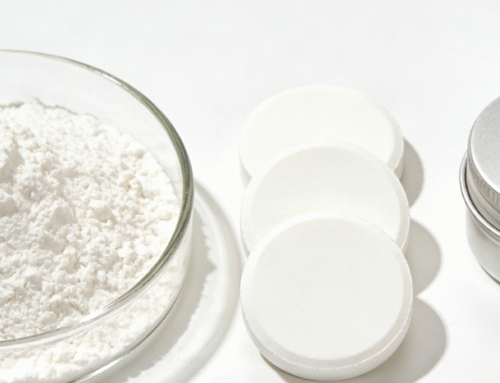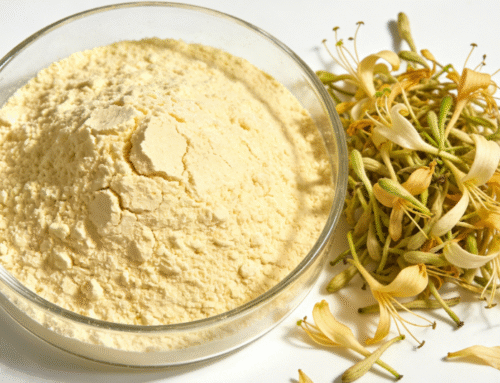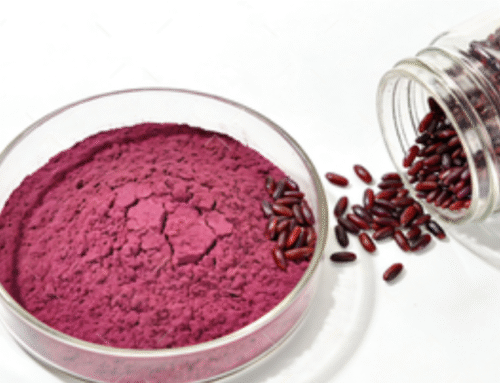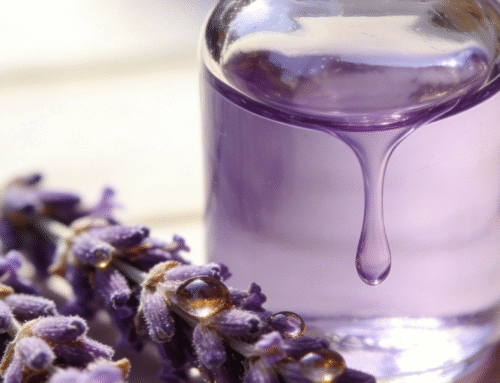Table of contents
- Introduction to Corosolic Acid
- Pharmacological effects of Corosolic Acid
- Physical and chemical properties of Corosolic Acid
- Benefitsof Corosolic Acid
- Clinical application of Corosolic Acid
-
Introduction to Corosolic Acid
Lagerstroemia Extract
Corosolic acid, also known as 2α-hydroxyursolic acid, is a triterpenoid compound present in Lagerstroemia lagerstroemia (commonly known as Barnabas, rich in the Philippine Islands). Crape myrtle is a folk medicine in Southeast Asian countries, commonly known as *banaba”. India uses its root as an astringent, and Malaysia uses its leaves to treat malaria, foot fractures, etc. In the Philippines, tea beverages made from its leaves are widely used in the treatment of And prevention of diabetes, known as “natural plant insulin”, effective oral administration and no side effects, can reduce weight without affecting appetite. In the 1990s, foreign scholars, especially Japanese scholars, studied it more, and its chemical composition and pharmacological effects have both In recent years, studies have found that it has hypoglycemic, weight loss, anti-tumor, anti-inflammatory, anti-viral and anti-cardiovascular disease effects, especially its better hypoglycemic activity, with a physiological effect similar to insulin, known as “plant” “Insulin” has attracted widespread attention, and a variety of health care products have been developed at home and abroad.
Corosolic acid, a natural compound containing antiangiogenic activity, inhibits angiopoietin-1-induced FAK signaling. Corosolic acid exerts anticancer activity against HCC, colon and colorectal Y cells by inducing apoptosis and promoting N-terminal phosphorylation and subsequent proteasomal degradation of β-catenin.
- Corosolic acid, 2-alpha-hydroxyursolic acid
English alias: (2alpha,3beta,5xi,18alpha)-2,3-dihydroxyurs-12-en-28-oic acid; (2alpha,3beta)-2,3-dihydroxyurs-12-en-28-oic acid
- Molecular formula: C30H48O4
- Molecular weight:472.7
- CAS No.: 4547-24-4
- Specifications: Corosolic acid 2%, Corosolic acid 3%, Corosolic acid 20%, Corosolic acid 30%, Corosolic acid-98% HPLC
- Pharmacological effects of Corosolic Acid
The results of in vitro and in vivo experiments showed that corosolic acid from Lagerstroemia lagerstroemia stimulates the transport of glucose and promotes the absorption and utilization of glucose by cells, thereby achieving its hypoglycemic effect. The excitatory effect of corosolic acid on glucose transport is similar to that of insulin, therefore, corosolic acid is also called plant insulin.
The results of animal experiments showed that Corosolic acid, an extract of Lagerstroemia praecox, had a significant hypoglycemic effect on normal rats and genetically diabetic mice.
Lagerstroemia lagerstroemia extract corosolic acid also has a weight loss effect. Clinical studies have found that after taking the drug, it can regulate the insulin and blood sugar levels in the body, and it has an obvious weight loss trend (monthly average weight loss is 0.908-1.816Kg), the process is relatively slow And no need to diet.
Corosolic acid also has many other biological activities, such as a significant inhibitory effect on TPA-induced inflammatory response, and its anti-inflammatory effect is stronger than the commercially available anti-inflammatory drug called nomethacin; it also has DNA Polymerase inhibitory activity, and has inhibitory effect on the growth of various tumor cells.
- Physical and chemical properties of Corosolic Acid
Corosolic acid is white amorphous powder (methanol), soluble in petroleum ether, benzene, chloroform, pyridine and other organic solvents, insoluble in water, soluble in hot ethanol and methanol. Under anhydrous conditions, with strong acid (sulfuric acid, phosphoric acid, perchloric acid), moderately strong acid (trichloroacetic acid) or Lewis acid (zinc chloride, aluminum trichloride, antimony trichloride), there will be a color reaction or fluorescent.
Corosolic acid belongs to α-amyrinol type or ursane type pentacyclic triterpenoids, and its basic skeleton is the pentacyclic parent nucleus of polyhydropinene.
Corosolic acid can exist free in plants or in the form of saponins. In plants, it often co-exists with its isomer maslinic acid (2α-hydroxyoleanolic acid), with similar structure and chemical properties, and it is difficult to separate.
Compared with insulin injection, its effect in the treatment of diabetes at present has the advantages of obvious oral effect, less toxic and side effects, and convenient use, and the effect is comparable to that of insulin injection.
- Benefitsof Corosolic Acid
- It can regulate the levels of insulin and blood sugar in the body, and has an obvious tendency to lose weight. The process is relatively slow and does not require dieting. So it can be used for weight loss.
- Corosolic acid has significant hypoglycemic effect.
- It has a significant inhibitory effect on the inflammatory response, and its anti-inflammatory effect is stronger than the commercially available anti-inflammatory drug indomethacin.
- It has inhibitory effect on the growth of various tumor cells, and has broad prospects in this aspect.
- Clinical application of Corosolic Acid
As a new plant drug for the prevention and treatment of obesity and type I diabetes, and a functional natural health food pharmaceutical raw material, Corosolic acid, an extract of Crape myrtle, has become a popular product in the market. Compared with the insulin injection, its effect for treating diabetes has the advantages of obvious oral effect, less toxic and side effects, convenient use, and the like, and the effect is comparable to that of insulin injection.
The content of corosolic acid in plants is generally very low, even in the crape myrtle with a high content of corosolic acid, the content of corosolic acid in its concentrated extract extracted by hot water is only about 0.01%; The content of corosolic acid in the concentrated alcohol extract of barnabas leaves is also only about 1%.
Corosolic acid is commonly used in weight loss supplements. It helps regulate blood sugar levels and acts as an antioxidant in the body. Antioxidant benefits of corosolic acid include protection against free radical damage and more. It also improves cell membrane health and supports kidney function in the body. Of course, its weight loss benefits cannot be ignored here, but there is currently no scientific evidence to support this claim.
Corosolic acid was once used to treat symptoms of diabetes. It promotes blood circulation and has insulin-like effects. It also helps lower blood sugar levels and promotes insulin uptake. Many studies have confirmed these benefits.
When used daily, the compound is said to allow a person to lose 4 pounds in a month. Much of this weight loss, though, has to do with it helping deliver insulin. Therefore, further research is needed to explore the potential efficacy of corosolic acid in weight loss.
Another benefit of corosolic acid is that it still helps lower blood sugar levels after the treatment cycle is over. Insulin needs to be injected because the oral dose is too small to have any effect on blood sugar levels. Oral intake of corosolic acid is sufficient to provide the same benefits as insulin.
In addition to eating whole foods rich in corosolic acid, you can increase your corosolic acid intake by taking supplements that contain this compound. This supplement is commercially available in tea beverages, in tablet form, and sometimes as part of a multivitamin. The recommended dose for diabetics is 30-40 mg per day.
Some of the side effects of corosolic acid include rash, headache, and fatigue. But the results of the study found that these side effects were often associated with excessive intake. Also, to ensure safety, this supplement is not recommended for children or pregnant women.
Xi’an Herb Bio is a professional supplier of natural extracts, able to provide customers with a wide variety of products to meet your needs. Friends who are interested in corosolic acid, please click the link below to contact us for more relevant information.
Need Corosolic Acid? Please contact Xi’an Herb Bio!






Leave A Comment